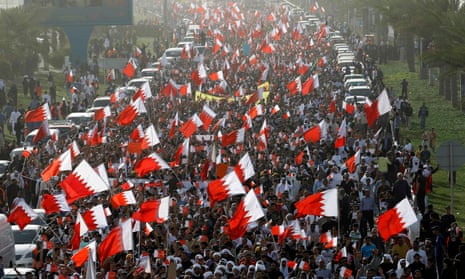The United States is resuming security aid to Bahrain’s military forces, saying there had been “meaningful progress” on human rights four years after the kingdom’s deadly crackdown on anti-government protesters.
“The administration has decided to lift the holds on security assistance to the Bahrain defence force and national guard that were implemented following Bahrain’s crackdown on demonstrations in 2011,” said a state department spokesman, John Kirby.
“While we do not think that the human rights situation in Bahrain is adequate … we believe it is important to recognise that the government of Bahrain has made some meaningful progress on human rights reforms and reconciliation.”
US officials did not specify what weapons, security equipment or systems would be transferred to Bahrain, but stressed that apart from items meeting a clear counter-terrorism need, the US “would maintain restrictions on security sales to the Bahrain ministry of interior [MOI]”.
The ministry “bore the preponderance of responsibility for government abuses in 2011”.
“We will lift this restriction as we determine that the government has taken additional, significant steps to improve MOI accountability and its treatment of detainees,” said Kirby.
Human Rights First condemned the decision, calling it a “major blow” to efforts to pressure Bahrain to implement human rights reform.
“There is no way to dress this up as a good move,” said a spokesman, Brian Dooley. “It’s bad for Bahrain, bad for the region and bad for the United States.”
He said Shia-majority Bahrain’s military was almost exclusively Sunni and expressed concern at increased sectarianism in the region.
At least 89 people have been killed in confrontations with Bahrain security forces since 2011, and hundreds have been arrested and put on trial, rights groups say.
Protesters continue to clash frequently with security forces in Shia villages outside Manama.
Bahrain has been rocked by unrest since security forces crushed Shia-led protests in 2011 that demanded a constitutional monarchy and an elected prime minister.
On 20 June Bahrain released a Sunni opposition leader, Ibrahim Sharif, who was jailed for more than four years for involvement in the anti-government demonstrations. Sharif had played a prominent role in the month-long protests and was later among a group of 20 activists tried for plotting to overthrow Bahrain’s Sunni rulers.
The release came four days after a Bahrain court jailed the prominent Shia opposition leader, Ali Salman, for four years for inciting disobedience and hatred.
Bahrain, home to the US navy’s fifth fleet, is seen as a vital partner in the international coalition against the Islamic State (Isis) group.
Apart from its anti-Isis commitment, “Bahrain’s logistical and operational support enables the US to lead a 30-nation military coalition that counters piracy and terrorism, maintains the free flow of commerce and energy resources through the strait of Hormuz and demonstrates international resolve to Iran”, state department officials said.

Comments (…)
Sign in or create your Guardian account to join the discussion